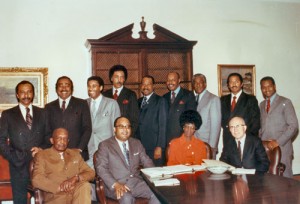
The 13 founding members of the CBC in the early 1970s. Standing L–R: Parren Mitchell (MD), Charles B. Rangel (NY), Bill Clay, Sr. (MO), Ron Dellums (CA), George Collins (IL), Louis Stokes (OH), Ralph Metcalfe (IL), John Conyers (MI), and Walter Fauntroy (DC). Seated L-R: Robert Nix, Sr. (PA), Charles Diggs (MI), Shirley Chisholm (NY), and Gus Hawkins (CA).
The Congressional Black Caucus is an organization representing the black members of the United States Congress. Membership is exclusive to African-Americans, and its chair in the 112th Congress is Representative Emanuel Cleaver of Missouri.
The caucus describes its goals as “positively influencing the course of events pertinent to African-Americans and others of similar experience and situation”, and “achieving greater equity for persons of African descent in the design and content of domestic and international programs and services.”
The CBC encapsulates these goals in the following priorities: closing the achievement and opportunity gaps in education, assuring quality health care for every American, focusing on employment and economic security, ensuring justice for all, retirement security for all Americans, increasing welfare funds, and increasing equity in foreign policy.
Representative Eddie Bernice Johnson, D-Tex., has said:
The Congressional Black Caucus is one of the world’s most esteemed bodies, with a history of positive activism unparalleled in our nation’s history. Whether the issue is popular or unpopular, simple or complex, the CBC has fought for thirty years to protect the fundamentals of democracy. Its impact is recognized throughout the world. The Congressional Black Caucus is probably the closest group of legislators on the Hill. We work together almost incessantly, we are friends and, more importantly, a family of freedom fighters. Our diversity makes us stronger, and the expertise of all of our members has helped us be effective beyond our numbers.
Mark Anthony Neal, a professor of African-American studies and popular culture at Duke University, wrote a column in late 2008 that the Congressional Black Caucus and other African-American-centered organizations are still needed, and should take advantage of “the political will that Obama’s campaign has generated.”